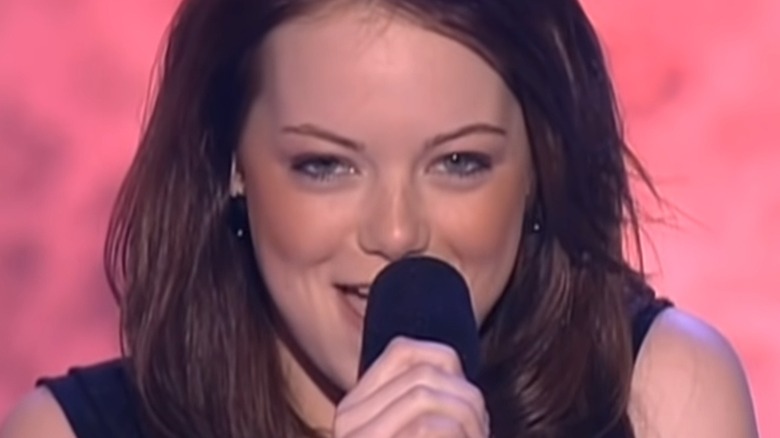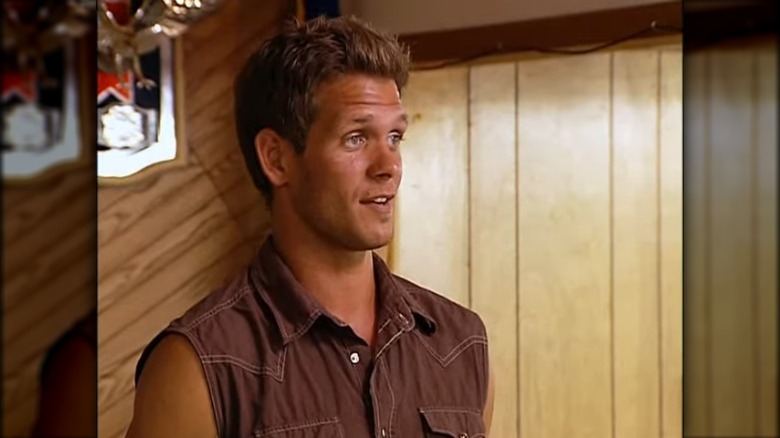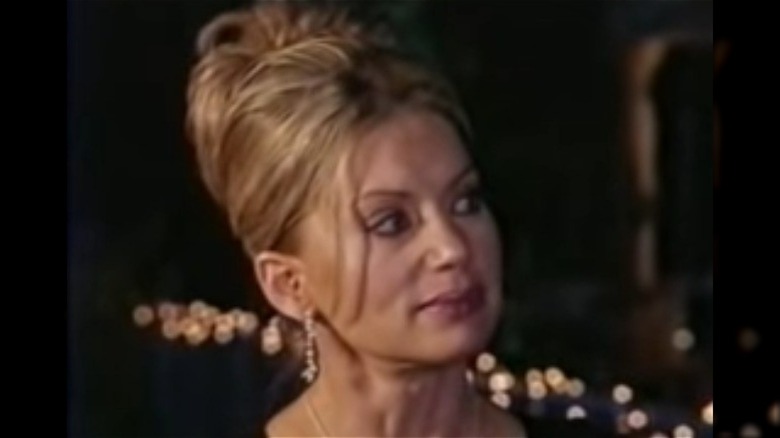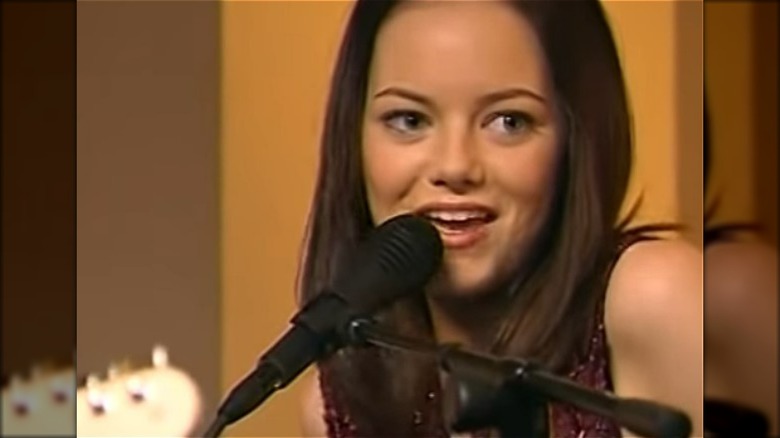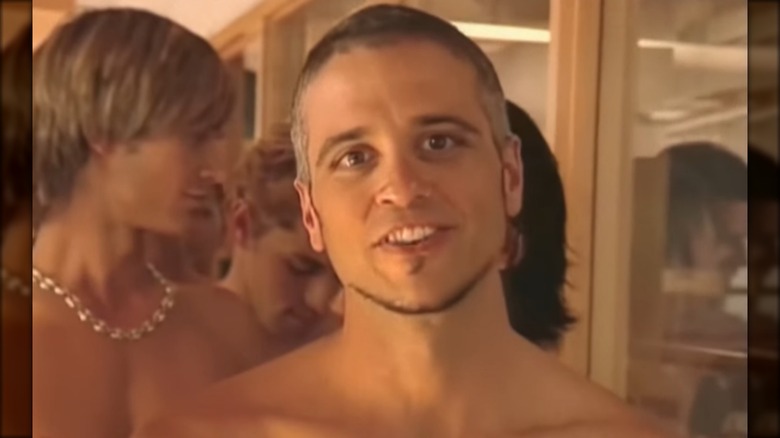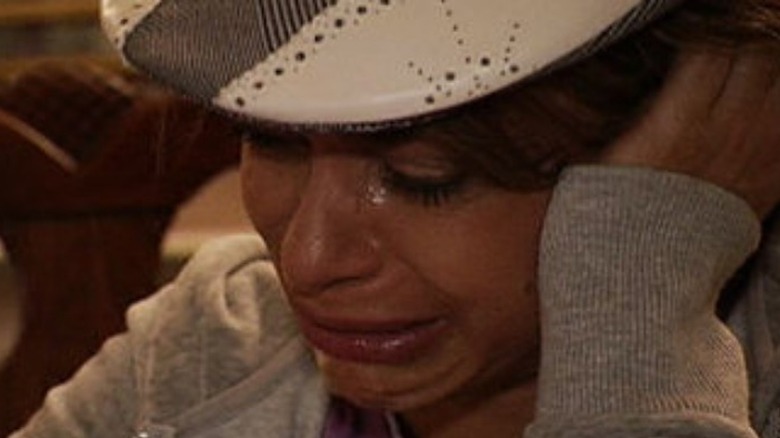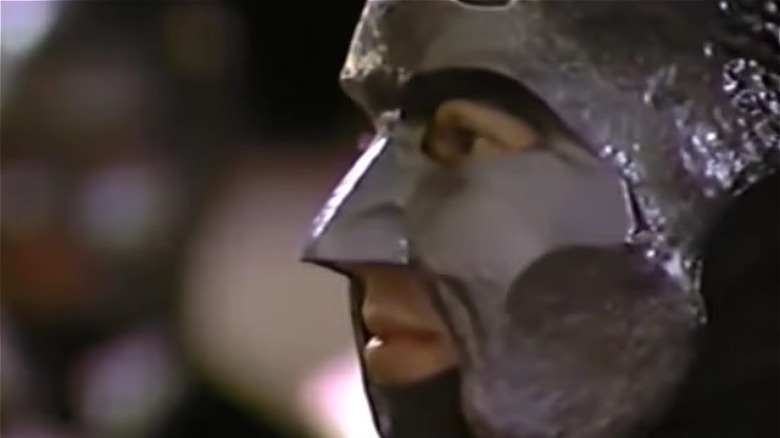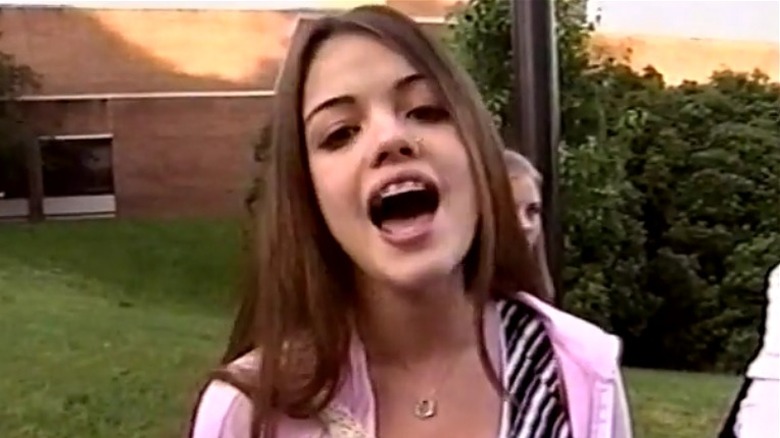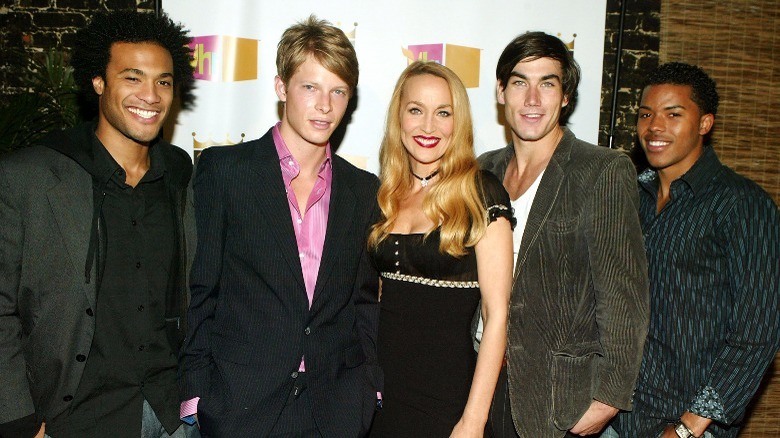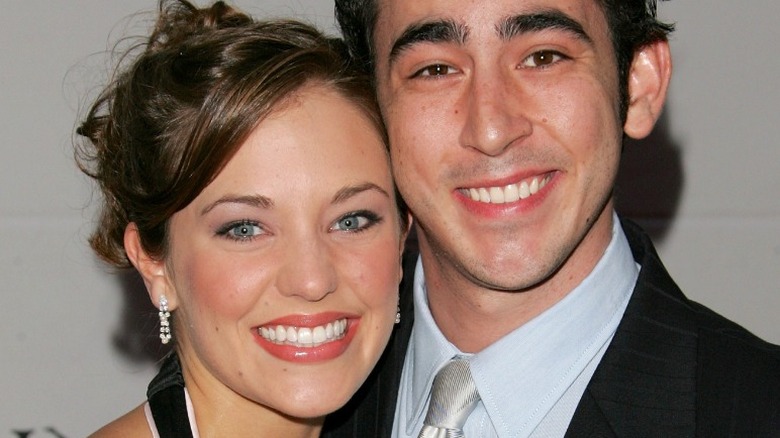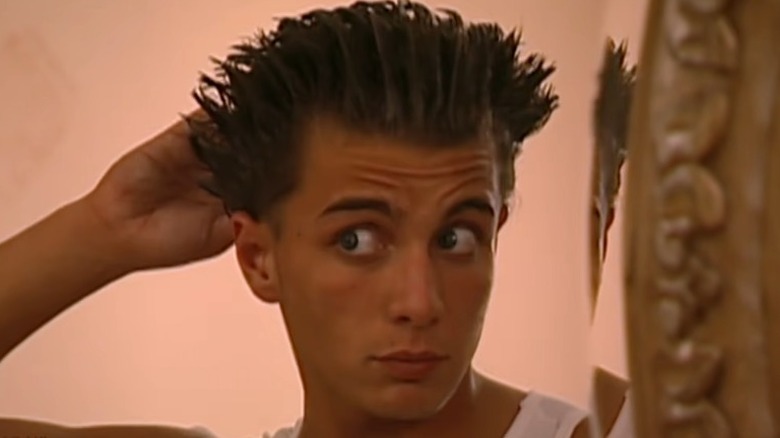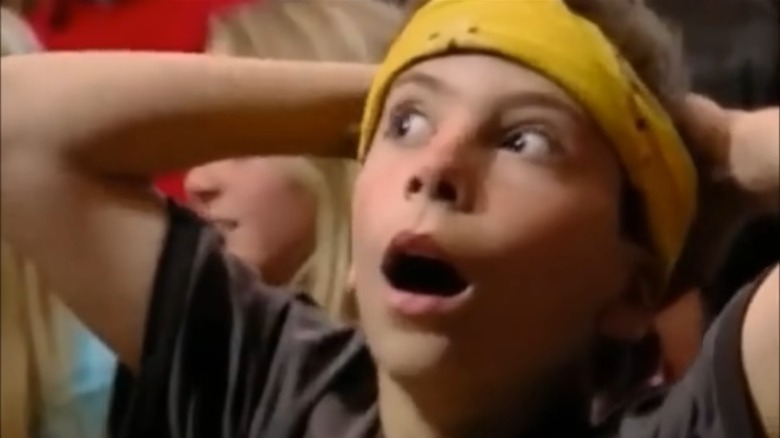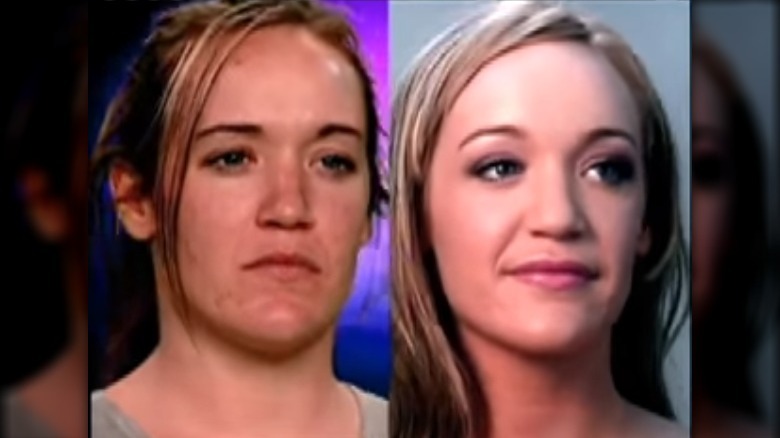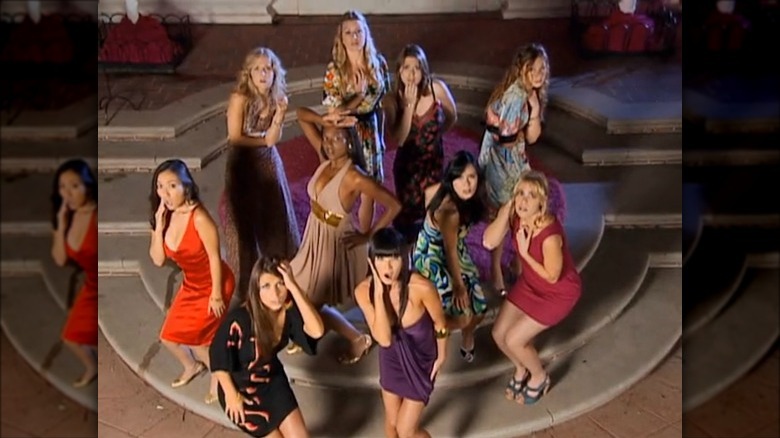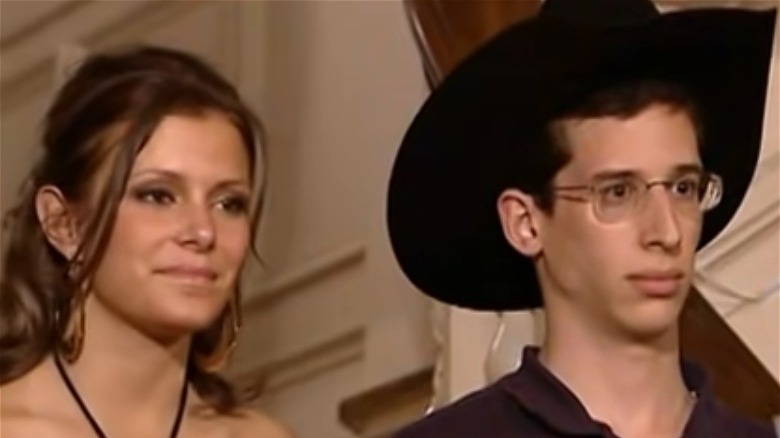A Look Back At The Wackiest Reality Shows From The 2000s
The 2000s were the decade of reality television. Audiences tuned in to watch real people in allegedly real situations, making shows like "American Idol" and "Big Brother" some of the biggest shows on the air. Television producer Mike Darnell later explained to SBS that a lot of the rise of reality TV was due to simple economics. "If you have to fill 40 hours of TV with scripted shows it'll cost you an arm and a leg," he said. "You'll be out of business because those scripted shows will do no better and probably worse than reality shows did."
However, while a lot of reality shows became unstoppable cultural juggernauts, plenty more existed, as Darnell hinted, simply to fill time. For every influential and popular show like "The Simple Life" or "The Real World," there were a dozen more shows that aired very few seasons, got very few viewers, and inspired much handwringing on the state of popular culture and what reality TV meant for national attention spans. A lot of these reality shows have since been all but forgotten, no longer really talked about and not available to stream anywhere online. Fear not! We've done some digging, so read on for a look back at the wackiest reality shows from the 2000s.
A farmer wanted a wife on Farmer Wants a Wife
Once upon a time, there was a farmer, and that farmer wanted a wife, so he got a reality show. The U.S. version of "Farmer Wants a Wife" (based on the UK series of the same name) was born in 2008. (Hey now, there was a writer's strike going on ... leave them alone.) The titular farmer was named Matthew Neustadt. He grew wheat, corn, and soybeans, per Reality TV World, working on a farm his family had owned since the 1940s. "I don't do the club scene any more at my age," the then-29-year-old told the River Front Times. "Most of my friends are married and on their first kid, and it's hard to find people to do much with." Consequently, 10 women went to Missouri to try to win his heart, with a camera crew from The CW in tow.
According to The Orange County Register, Neustadt chose contestant Brooke Ward to be the titular wife. Ward said, "We left a lot of things unsaid, and we both were kind of scared to admit we had real feelings for each other. And then when he came out here in April for some publicity, we kind of rekindled things. So now we're dating, and I'm going to move and see what happens." What happened, per STL Today, was that they wound up going their separate ways.
Alas, the farmer did not find his wife, and "Farmer Wants a Wife" didn't find a second season — though a Fox reboot was announced in September 2022.
Who's Your Daddy? was Fox's adoption debacle
A lot of 2000s-era reality shows have been lost to the big TV graveyard in the sky because audiences were simply overwhelmed by the sheer amount of arguably tasteless content choking the airwaves, and the shows flopped. One such failure was the provocatively titled "Who's Your Daddy?" which managed to air only one episode in 2005. The show was about a woman named TJ Myers who was adopted at birth; producers reunited her with her birth father but hid him among a group of imposters. If Myers could correctly guess which of the men was her dad, she'd win money; if she eliminated her birth father, the guy who managed to fool her would take home the cash.
Understandably, the show was controversial before it even aired. "By turning adoption reunions into a game show, 'Who's Your Daddy?' takes an intensely personal and complex situation ... and transforms it into a voyeuristic display," Deborah Capone told Today; this mother had adopted her daughter, and subsequently organized an email campaign to try to get the show canceled.
Producers defended it, though. Fox's head of reality programming told Variety (via The Guardian), "I guarantee you: if you have any heart, you'll be bawling at the end of the show." Myers, too, defended "Who's Your Daddy?" when she told a radio DJ, per the New York Daily News, "It was just absolutely amazing and full of love. I didn't understand why, when everybody wanted to meet each other, the adoption agencies are upset."
VH1 sought the Partridge Family and found Emma Stone
In early 2004, VH1 announced (via Entertainment Weekly) that they were moving forward with a revival of "The Partridge Family," the classic singing-family sitcom that produced stars like David Cassidy and Danny Bonaduce. Before the sitcom came back, though, the network greenlit a companion reality show that they would use to cast the eventual series. "In Search of the Partridge Family" was born, a combination singing and acting competition that would land winners a coveted spot on the pilot of the new sitcom.
While the new "Partridge Family" only ever aired said pilot, the reality show managed to produce something few series other than "American Idol" were able to say: a genuine star. Future Academy Award-winning actor Emma Stone was a contestant on the reality show, performing a cover of Meredith Brooks' "B***h" that regularly goes viral when people remember the show existed, per Rolling Stone.
Stone gave an interview after winning to Robrt L. Pela at the Phoenix New Times, whose questions arguably exemplified the misogyny of the era. "You're about to become a superstar — the next Lindsay Lohan, except with real breasts," the reporter told Stone, who was only 16 at the time of the interview. He went on to caution her that she needed to watch her weight. "There are some creepy people," Stone answered. "There's this 40-year-old guy who started this Yahoo! Group about me with screen caps and stuff, and that's so weird." Weird, indeed.
Hunks on Strip Search stripped for the Strip
VH1 in the aughts was a seemingly lawless place where anything could and would happen, and in that respect, "Strip Search" fit right in. The cleverly titled show was a national competition searching for strippers — male strippers — who would, if they were to win, receive a lucrative contract to perform in an all-male revue on the Las Vegas Strip. Basically, it was "Magic Mike" before there was a "Magic Mike" ... or a "Finding Magic Mike."
"Watching 15 shirtless guys bicker, work out, learn how to dance and then bicker shirtless some more ... is well ... wonderful tv!" wrote one blogger in a review of the show. The short-lived 2005 series came at a pivotal point in culture, premiering as debates over metrosexuals were raging and shortly after the republican party tried to pass a Constitutional Amendment to ban same-sex marriage. "Strip Search" was pointed to as an example of the then-new trend of men waxing their body hair; Salon called them "smoothies" in a piece on the culture. Male stripping was also on the rise overall, as The Denver Post noted.
While there were also iterations of the show in Canada, Australia, New Zealand, and the UK, the winners of the U.S. version — who had to compete in the likes of thong-dance challenges — performed in "American Storm," a Vegas show that ran for several years, according to Nevada Magazine. "Gentlemen are welcome [to attend the strip show]," they pointed out.
Viewers said: 'Hey, Paula ... you okay?'
"American Idol" was one of the biggest shows on television throughout the 2000s, and with that came renewed interest in the career of Paula Abdul. "Hey Paula" on Bravo was a 2007 reality show following the life of the "Forever Your Girl" hitmaker, but the series did not portray her in nearly the same positive light as the talent show she judged. The Variety review of the series noted numerous instances where Abdul seemed to blame everything on her assistants rather than taking responsibility for her own career.
"I'm tired of people not treating me like the gift that I am," Variety quoted Abdul as telling the cameras, and the show did indeed give viewers at least one gift. "Hey Paula" is now most memorable for a viral clip, in which the former MC Skat Kat collaborator cries upon learning she was let go from "The Bratz Movie." A quick email check before bed leads to the bad news. "Now all of a sudden, I'm infuriated," Abdul narrated tearfully. "... I wonder, where is God when you need Him, because this does not make any sense." Despite the seemingly clear series of events, Abdul's reps later blamed "very creative editing" for the moment and claimed she walked away from the film, per Us Weekly.
Abdul later told Andy Cohen on "Watch What Happens Live" that she regrets the vast majority of the show. "It's always a life lesson. ... Think twice before you decide to do a show called 'Hey Paula,'" she said.
The masks on Mr. Personality may have ruined the show
There were a lot of dating shows on television in the 2000s, and many of them prioritized beauty and looks over brains and personality. In an attempt to correct this, Fox aired a show called "Mr. Personality" in 2003, hosted by Monica Lewinsky, that aimed to focus more on the likability of the suitors rather than the handsome faces and conventionally attractive bodies other reality shows elevated.
The only problem was ... viewers found the show to be downright creepy. In an attempt to get the series' central woman, Hayley Arp, to get to know the men instead of feeling physical attraction, producers put the suitors in terrifying masks that concealed their facial features. CNN reported that the men looked average anyway, though you wouldn't know it beneath their facial hoods, helmets, and sculpted visages that inspired more terror in viewers than affection.
"I thought it was stupid. ... [But] I was always up for something that I was actually building with my hands," mask designer Tina Haatainen-Jones later told The Outline. "They wanted a mask without any personality. So just a neutral mask. ... I wanted to make them more interesting, so I made it like a beaten metal kind of sculpture." Producer Scott Firestone admitted, "I think it probably did come off rather ridiculously in the end."
American Juniors accidentally found a star
"American Idol" had a stranglehold over the ratings during the 2000s, so it makes sense that Fox would try for a spinoff to capitalize on the flagship show's success. "American Juniors" premiered in 2003 between two seasons of "Idol," and unlike the original show, this one was looking for children singers. "This is a search for a group of super-talented young kids," host Ryan Seacrest told viewers in the show's first episode. "We're looking for a band of five that will end up competing with Ruben [Studdard] and Kelly [Clarkson] and others for the top of the charts. This will be huge." It ... wasn't.
One of the winners, though — who went on to be a part of the American Juniors band — was none other than "Pretty Little Liars" star Lucy Hale. She would later reunite with Seacrest to co-host "Dick Clark's New Year's Rockin' Eve" in 2019 (via TVLine). Hale also made a friend at the show's auditions, another talented youngster who can be glimpsed briefly in the first episode of the series; years later on Twitter, Hale revealed, "Fun fact: Keke [Palmer] and I met during auditions for 'American Juniors' when i was 13 and she was 9."
The show only aired one season, and while Today noted that the group did indeed release an album together, it went nowhere on the charts. It certainly didn't compete with Ruben Studdard, let alone one of "Idol's" biggest success stories, Kelly Clarkson. Nowadays, "American Juniors" is pretty much only memorable as a footnote in Palmer and Hale's later careers.
Jerry Hall wanted a man to keep on Kept
On "Kept," a VH1 reality show that aired one single season in 2005, Mick Jagger's ex-wife and socialite Jerry Hall searched the country for a so-called kept man. "Kept" wasn't exactly a dating show; rather than looking for someone to fall in love with her, Hall was instead simply searching for some eye candy she could bring as her plus-one to industry events, someone she could spoil in exchange for keeping her company. The men had to compete in challenges like etiquette and modeling lessons, and in exchange they would receive a year-long lease on a penthouse in London and what the New York Post called "a six-figure allowance."
A man named Seth Frye won, according to Entertainment Weekly, but he seemed pretty over it once the show ended. "I'm supposed to say I'm going to be at Jerry's beck and call, blah blah blah. I had a great time. But I really don't know," he told the magazine. "Gimme my hundred grand."
It seems that Hall was over him, too. Frye told TVSA that he did receive the $100,000 prize money, but he did not have to follow through on being, well, kept. "After the last shot I was whisked away for a bunch of exit interviews never to see her again," he confessed. After the finale aired, viewers were never to see "Kept" again, either.
Audiences didn't want Grease: You're the One That I Want
Like many talent competition reality shows in the 2000s, "Grease: You're the One That I Want" offered as its prize a role on another piece of media; in other words, a reality show as a cross-promotional branding opportunity. In this case, the series handed its winners the lead roles in a much-hyped revival of the classic musical, per Broadway.com, which opened on the Great White Way several months after the finale of the show aired in 2007.
The reality show itself was perceived as a campy mess; for example, one episode featured a dance number where the hopefuls had to physically fight one another over the coveted parts. A former contestant told Playbill that the cast would secretly meet — away from prying cameras — in the restroom to plan out all of the negative comments they'd make in their confessionals about their competition so that no one's feelings got hurt. Unfortunately, the New York Post reported that the series wasn't translating to a desired bump in Broadway ticket sales. "It's not turning out to be the magic bullet we'd hoped," an insider claimed.
Future Broadway star Laura Osnes won the role of Sandy, while Max Crumm won Danny. "Whoa!" Crumm said when they won, per AP (via The Denver Post). "I keep in touch with everyone from the Grease TV show!!' they revealed on Twitter years later. "They are all amazing/talented peeps." Other alums who have since gone on to lead Broadway casts include Kate Rockwell, who originated Karen in "Mean Girls."
Mobsters and hair gel ruled Growing Up Gotti
Before the tanned and gelled days of "Jersey Shore," there was "Growing Up Gotti," an A&E reality show about the children of Victoria Gotti. She's the daughter of John Gotti, the infamous mobster whose life would later inspire a famously critically panned John Travolta film. Victoria lived with three teenage sons named Frank, John, and Carmine, and the show followed the family's exploits as they ... well, mostly just bickered a lot. The boys wore distractingly blue contact lenses, because why not? It was 2004!
Critics were not kind to the show, to put it mildly. According to the New York Daily News, one contemporaneous review on Film.com read, "Victoria Gotti has the warmth of an ice pick and her sons the charm of, well, thugs." An article about the series in Deseret News was titled, fittingly, "Go away 'Gotti'!" Victoria's reasoning for signing her family up for the show strained credulity with a lot of viewers. "I think I did it for my children, believe it or not," she reportedly said, adding that she didn't want her boys "to go out in the world and be known as the Mafia princes, blah, blah, blah."
Though the boys told the New York Post that the filming process was difficult, Carmine added, "It's better than 'The Osbournes,' because we're in it." The show managed to air 40 episodes across three seasons in the 16 months it was on air, so clearly, someone must have been watching.
The nation said 'no' to Kid Nation
"Survivor" wasn't the first reality show, but as The Washington Post noted, it was one of the earliest and most influential in shaping the kinds of reality television that would follow. One such experiment that owed a debt to "Survivor" was "Kid Nation," a 2007 CBS show that lifted "Survivor's" idea of putting a bunch of people in a remote location and watching as they develop a society and compete for resources. One major problem, though; the contestants were children.
As you might imagine, "Kid Nation" was a hugely controversial series. LA Weekly ran an op-ed demanding it be pulled from the schedule. Citing other pieces of criticism, the outlet noted a general sense that, as reality TV ran amok, we needed to "reestablish the line between entertainment and exploitation." It turned out that there were numerous problems on the show, as feared. Amid allegations of child abuse and labor law violations (investigations into these claims were eventually dropped), there were various injuries, and perhaps even more concerning, according to The New York Times, several kids on the show accidentally drank bleach. As BuzzFeed recalled in a roundup of wildest moments, there was even an incident where a kid killed two chickens for food, and another asked, "Are they, like, going to hang them like they did Saddam Hussein?" Ah, the 2000s.
However, despite all of the controversy and eventual cancellation, some of the kids had a blast. In 2020, former contestant Laurel McGoff insisted to the AV Club, "My experience on the show was the ultimate best experience of my life."
If you or someone you know may be the victim of child abuse, please contact the Childhelp National Child Abuse Hotline at 1-800-4-A-Child (1-800-422-4453) or contact their live chat services.
The Swan was influential but controversial
Reality television arguably sank to some incredibly exploitative lows in the 2000s, and perhaps no show sank lower than Fox's short-lived series "The Swan." The 2005 competition show revolved around women receiving plastic surgery live on television, adjusting all of their physical insecurities in an attempt to make them more, well, conventionally beautiful.
In addition to the very nature of the show causing controversy, Entertainment Weekly reported that the show was often "Frankenbited," meaning editors chopped up dialogue to make people sound like they were saying things thy didn't mean. And, according to the New York Post, a lot of the transformations didn't stick. Former contestant Laurie Arias admitted later, "I had the most surgeries of any Swan in the history of the show and it has all gone to absolute s**t. I am a 300-pound mess of a person who is afraid to go outside."
However, another previous contestant named Rachel Love insisted to Metro that it wasn't the show's fault that not everyone's transformation lasted. "I would have thought [the producers] would have helped a little more with that. But what can you expect from them?" she said. "Reality shows aren't there to guide you for the rest of your life." Nevertheless — or perhaps because of how controversial it was and how painful it apparently became for some people involved — Time named it one of the most influential seasons of reality television ever.
VH1's Scream Queens sought a Saw star
Like "Grease: You're the One That I Want" and "In Search of the Partridge Family," VH1's reality show "Scream Queens" was a competition that offered a role in a different property to its winner. In this case, the series' two seasons sought to find leading ladies to star in "Saw VI" and "Saw 3D," promising its winners so-called "breakout roles." The series premiere teased audiences with "eight grueling weeks designed to discover which of these actresses has the skill and charisma to be a horror movie star ... a scream queen!" Judges included "Slither" director James Gunn, who would go on to helm the "Guardians of the Galaxy" franchise for the Marvel Cinematic Universe.
Tanedra Howard won the first season. Gunn wrote in a blog for Moviemaker that he had her pegged as the winner halfway through, but they had to make good television. He criticized the eventual winner in previous installments of the blog, leading to conflict with Howard, although he explained he was merely trying to mislead viewers. Reality show drama that spilled over onto blogs? What's more 2000s than that!
"It is an amazing life changing experience for me to say I am a working actress now," Howard told Vibe in 2010. "... I got it only after two years of being in the business." However, as fans on Reddit noted years later, neither Howard nor Season 2 winner Gabby West had particularly large roles in the horror franchise, and neither really went on to be breakouts as promised.
Beauties met geeks on Beauty and the Geek
On the Ashton Kutcher-produced series "Beauty and the Geek" — which bridged the gap when The WB became The CW — conventionally beautiful women were paired up with awkward, nerdy men to compete in challenges. "This is not a dating show," the series explained in its opening moments. "This is a social experiment, to see if beautiful women can turn geeks into social superstars. ... And can a group of geeks help these beauties become more than just a pretty face?" Challenges included the so-called geeks attending fashion shows while the dubbed beauties had to help fix cars, because it was the 2000s and gender essentialism was seemingly all the rage.
It seems that, all things considered, the show may not have been as exploitative as it could have been. "I was really happy with the way the show portrayed me," Season 4 contestant Jesse Yeary told Reality TV World in 2007. "I was kind of worried beforehand. There's tons of things they could use that make me look way more awkward and stuff than what they even showed on the show, so I was pretty pleased."
While the series only lasted a handful of years in the United States, the format was successful abroad; "Beauty and the Geek Australia" has been airing consistently since 2009, including a season that aired in 2022.

